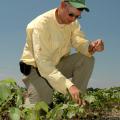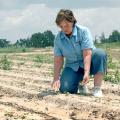News From 2006
MISSISSIPPI STATE -- Hot, dry conditions are not unusual for Mississippi summers, but the rapid change from mild spring weather is increasing stress on crops, pastures and livestock.
The need for rain spreads from the top of the state to the Gulf Coast. Farmers who dreaded the start of hurricane season now find themselves wishing for a mild tropical storm.
MISSISSIPPI STATE-- A Mississippi State University economist has been named a Fellow of a nonprofit organization working to improve the economic health of agriculture.
Darren Hudson, an associate professor in MSU’s Department of Agricultural Economics, is a 2006 Farm Foundation Fellow. This is the program’s first year and the MSU economist is one of three named to the initial class.
Founded in 1933, the Farm Foundation’s mission includes funding and promoting research to produce practical tools for improving the well-being of people in rural America.
By Norman Winter
MSU Horticulturist
Central Mississippi Research & Extension Center
It's funny that melapodiums I used to consider ideal beginner plants are now “must haves” during summers that have a penchant to be both hot and dry.
MISSISSIPPI STATE -- Good intentioned Mississippians try to rescue hundreds of baby birds and animals they find each year, but wildlife experts caution that often these tiny animals do not need help.
The first thing to remember when finding a baby animal or bird is that it is against state law to keep the animal, even just to save its life. Contact the Mississippi Department of Wildlife, Fisheries and Parks, the Mississippi State University College of Veterinary Medicine or a local, licensed wildlife rehabilitator to rescue the animal.
MISSISSIPPI STATE -- Mississippi's commercial watermelon producers enjoyed an early start for their crop, but now nonirrigated melons are reaching a critical need for water to finish maturing in time for the
Fourth of July.
Smith County Extension director Charles Waldrup said watermelons had excellent conditions early in the season, but they are facing an urgent need for water. This year's melons should be very sweet because of the growing conditions.
MISSISSIPPI STATE -- A forestry timber tax specialist at Mississippi State University was named Extension Forester of the Year by the Forest Landowner Association.
Debbie Gaddis, associate Extension professor in the College of Forest Resources, received the honor at the recent annual meeting of the organization in San Antonio, Texas.
MISSISSIPPI STATE -- Farmers trying to stay ahead of the Asian soybean rust threat to their Mississippi crop have a new information resource.
Alan Blaine, soybean specialist with the Mississippi State University Extension Service, said as of late May, the disease had not been detected in any of Mississippi or Alabama’s sentinel plots, although it has been detected in five patches of kudzu in Alabama. Those monitoring the disease have not seen it move yet to any soybeans this year.
By Norman Winter
MSU Horticulturist
Central Mississippi Research & Extension Center
Recycling is popular in today's society, but the idea rarely conjures up visions of beauty. One Tallahatchie County gardener has developed a garden with old items that would make many people clean out their attics and garages in search of ornamental items to create unique displays.
MISSISSIPPI STATE -- Heat and humidity make it uncomfortable to work or play strenuously outside during Mississippi summers, but the high temperatures can be more than an inconvenience.
Jane Clary, health specialist with the Mississippi State University Extension Service, said heat exhaustion, heat stroke, also known as sun stroke, and heat cramps are all caused by physical exertion without adequate hydration. All are caused when the body fails to cool itself adequately. While most common in the summer, they can occur in cold weather, too.
MISSISSIPPI STATE -- Cool spring temperatures may have contributed to an increase in herbicide drift damage to Mississippi's rice fields this year.
“We may have had more wind this spring, and the cold weather probably weakened the plants and made them more susceptible to drift,” said Don Respess, Bolivar County director for Mississippi State University's Extension Service. “Uninjured plants have responded well to fertilizer and water applied in the last weeks of May and are looking good.”
MISSISSIPPI STATE -- The evolving global energy market and the challenges and opportunities it presents agriculture will be the topics of the Mississippi Agricultural Economics Association annual symposium in Starkville.
The symposium will be held June 22 and 23 at Mississippi State University in the Forest Products Auditorium. The public and those representing the ag industry, business and finance are invited to attend. A $20 symposium fee covers the Friday meeting and lunch.
By Norman Winter
MSU Horticulturist
Central Mississippi Research & Extension Center
These first hot summer months send people searching for some colorful flowers that can take the Mississippi heat and humidity while providing a dazzling display in the landscape. With those goals in mind, pentas are hard to beat.
MISSISSIPPI STATE -- Mississippi State University was a little greener the last week in May as more than 750 4-H youth and adult volunteers converged for the 2006 State 4-H Congress.
Their theme of “Green people doing great things” played off the color they wore so prevalently and the community service projects they do throughout the year and while on campus. They represented the nearly 90,000 4-H members in Mississippi.
MISSISSIPPI STATE -- First Lady Laura Bush is among the hundreds of spectators this summer expected to view a play by Mississippi 4-H members promoting literacy.
The lead writer of “Sarah and the Magical Mix-Up” was Linda Mitchell, 4-H technology and creative programming specialist with Mississippi State University's Extension Service.
MISSISSIPPI STATE -- The potential for record yields and the opportunity for excellent 2007 crop prices should reverse Mississippi's recent trend of reduced wheat acreage.
Mississippi growers now are harvesting 70,000 acres of wheat, which is about half the 2004 acreage and one-third as much as in 2001. Yields are predicted near the 2000 record of 55 bushels per acre.
MISSISSIPPI STATE -- In 1946, Harris Barnes Jr. began taking snapshots of his first child, Harris III. Sixty years and three more children later, the Clarksdale resident has a photojournalism legacy that includes three books and hundreds of articles and photos in a variety of farm publications.
Barnes' first book, “Cotton: A 50 Year Pictorial History,” was published in 2002. “The Beauty of Southern Agriculture” followed in 2004, and his latest, “Good Old Days on the Cotton Farm: A History,” is set for release in September.
By Norman Winter
MSU Horticulturist
Central Mississippi Research & Extension Center
What plant was a 1997 Mississippi Medallion award winner, a 1997 Georgia Gold Medal winner, a 1997 Louisiana Select winner, a 1999 Arkansas Select winner, a 1999 Texas Superstar winner and a 2000 Oklahoma Proven award winner, but you probably still haven't tried it? Answer: the scaevola.
MISSISSIPPI STATE -- Termites have nearly finished their swarming season in Mississippi, but their threat continues year-round, only less visibly.
Blake Layton, entomologist with the Mississippi State University Extension Service, said termites from established colonies swarm once a year to start new colonies. Winged swarmers fly out, pair up for mating, fall to the ground and lose their wings before trying to start a new colony.
“Thank goodness it happens because many people wouldn't realize their houses had termites if they didn't swarm,” Layton said.
MISSISSIPPI STATE -- Hot temperatures in April excited cotton growers with the prospect of an early crop, but the return of cool, wet conditions delayed growth and later plantings.
Peggy Thaxton, associate professor at the Delta Research and Extension Center in Stoneville, said her research plots were not planted until mid-May.
MISSISSIPPI STATE -- Mississippi producers may get some financial assistance from the U.S. Department of Agriculture in their continuing recovery from the devastation caused by the 2005 hurricanes.
In early May, USDA announced four crop and livestock assistance programs backed by $250 million in funds for producers affected by the destruction. The four programs are livestock indemnity, feed indemnity, hurricane indemnity and tree indemnity.
Pages
News Types
- Crop Report (424)
- Feature Story (5882)
- Feature Photo (53)
- Extension Outdoors (318)
- Southern Gardening (1454)
- Extension Inbox (95)
Archive
- 2025 (5)
- 2024 (190)
- 2023 (182)
- 2022 (186)
- 2021 (177)
- 2020 (212)
- 2019 (223)
- 2018 (276)
- 2017 (338)
- 2016 (383)
- 2015 (457)
- 2014 (498)
- 2013 (490)
- 2012 (492)
- 2011 (356)
- 2010 (323)
- 2009 (313)
- 2008 (273)
- 2007 (263)
- 2006 (252)
- 2005 (278)
- 2004 (273)
- 2003 (279)
- 2002 (228)
- 2001 (238)
- 2000 (243)
- 1999 (233)
- 1998 (232)
- 1997 (239)
- 1996 (58)
- 1995 (36)








